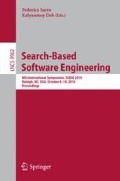Abstract
Most software testing researches on Extended Finite State Machine (EFSM) have focused on automatic test sequence and data generation. The analysis of test generation efficiency is still inadequate. In order to investigate the relationship between EFSM test data generation efficiency and its influence factors, according to the feasible transition paths of EFSMs, we build a multi-gene genetic programming (MGGP) predictive model to forecast EFSM test data generation efficiency. Besides, considering standard genetic programming (GP) and neural network are commonly employed in predictive models, we conduct experiments to compare MGGP model with GP model and back propagation (BP) neural network model on their predictive ability. The results show that, MGGP model is able to effectively predict EFSM test data generation efficiency, and compared with GP model and BP model, MGGP model’s predictive ability is stronger. Moreover, the correlation among the influence factors will not affect its predictive performance.
Access this chapter
Tax calculation will be finalised at checkout
Purchases are for personal use only
References
Abdi, H., Williams, L.J.: Principal component analysis. Wiley Interdisc. Rev.: Comput. Stat. 2(4), 433–459 (2010)
Anand, S., Burke, E.K., Chen, T.Y., Clark, J., Cohen, M.B., Grieskamp, W., Harman, M., Harrold, M.J., McMinn, P., et al.: An orchestrated survey of methodologies for automated software test case generation. J. Syst. Softw. 86(8), 1978–2001 (2013)
Asoudeh, N., Labiche, Y.: Multi-objective construction of an entire adequate test suite for an EFSM. In: 2014 IEEE 25th International Symposium on Software Reliability Engineering (ISSRE), pp. 288–299. IEEE (2014)
Gallagher, M.J., Narasimhan, V.L.: ADTEST: a test data generation suite for Ada software systems. IEEE Trans. Softw. Eng. 23(8), 473–484 (1997)
Gandomi, A.H., Alavi, A.H.: A new multi-gene genetic programming approach to nonlinear system modeling. Part I: materials and structural engineering problems. Neural Comput. Appl. 21(1), 171–187 (2012)
Garg, A., Tai, K.: Comparison of regression analysis, artificial neural network and genetic programming in handling the multicollinearity problem. In: 2012 Proceedings of International Conference on Modelling, Identification & Control (ICMIC), pp. 353–358. IEEE (2012)
Garg, A., Tai, K.: Stepwise approach for the evolution of generalized genetic programming model in prediction of surface finish of the turning process. Adv. Eng. Softw. 78, 16–27 (2014)
Garg, A., Tai, K., Gupta, A.: A modified multi-gene genetic programming approach for modelling true stress of dynamic strain aging regime of austenitic stainless steel 304. Meccanica 49(5), 1193–1209 (2014)
Garg, A., Vijayaraghavan, V., Mahapatra, S., Tai, K., Wong, C.: Performance evaluation of microbial fuel cell by artificial intelligence methods. Expert Syst. Appl. 41(4), 1389–1399 (2014)
Han, C., Wang, J., Zheng, M., Wang, E., Xia, J., Li, G., Choe, S.: New variogram modeling method using MGGP and SVR. Earth Sci. Inf., 1–17
Jiang, L., Zhao, R., Li, Z.: Analysis of efficiency-factors model of test data generation based on extended finite state machine specifications. J. Comput. Appl. 33(A02), 229–234 (2013)
Kalaji, A.S., Hierons, R.M., Swift, S.: Generating feasible transition paths for testing from an extended finite state machine (EFSM) with the counter problem. In: 2010 Third International Conference on Software Testing, Verification, and Validation Workshops (ICSTW), pp. 232–235. IEEE (2010)
Kalaji, A.S., Hierons, R.M., Swift, S.: An integrated search-based approach for automatic testing from extended finite state machine (EFSM) models. Inf. Softw. Technol. 53(12), 1297–1318 (2011)
Kaydani, H., Mohebbi, A., Eftekhari, M.: Permeability estimation in heterogeneous oil reservoirs by multi-gene genetic programming algorithm. J. Petrol. Sci. Eng. 123, 201–206 (2014)
Lin, X., Pomeranz, I., Reddy, S.M.: Techniques for improving the efficiency of sequential circuit test generation. In: Proceedings of the 1999 IEEE/ACM International Conference on Computer-Aided Design, pp. 147–151. IEEE Press (1999)
Mahajan, M., Kumar, S., Porwal, R.: Applying genetic algorithm to increase the efficiency of a data flow-based test data generation approach. ACM Sigsoft Softw. Eng. Not. 37(5), 1–5 (2012)
Mohammadzadeh, D., Bazaz, J.B., Yazd, S.V.J., Alavi, A.H.: Deriving an intelligent model for soil compression index utilizing multi-gene genetic programming. Environ. Earth Sci. 75(3), 1–11 (2016)
Panthi, V., Mohapatra, D.P.: Automatic test case generation using sequence diagram. In: Aswatha Kumar, M., Selvarani, R., Kumar, T.V.S. (eds.) Proceedings of ICAdC. AISC, vol. 174, pp. 277–284. Springer, Heidelberg (2013)
Schrammel, P., Melham, T., Kroening, D.: Generating test case chains for reactive systems. Int. J. Softw. Tools Technol. Transf., 1–16 (2014)
Searson, D.P., Leahy, D.E., Willis, M.J.: Gptips: an open source genetic programming toolbox for multigene symbolic regression. In: Proceedings of the International Multiconference of Engineers and Computer Scientists, vol. 1, pp. 77–80. Citeseer (2010)
White, T.: Increasing the efficiency of search-based unit test generation using parameter control, pp. 1042–1044 (2015)
Zhang, J., Yang, R., Chen, Z., Zhao, Z., Xu, B.: Automated EFSM-based test case generation with scatter search. In: Proceedings of the 7th International Workshop on Automation of Software Test, pp. 76–82. IEEE Press (2012)
Zhao, R., Harman, M., Li, Z.: Empirical study on the efficiency of search based test generation for EFSM models. In: Third International Conference on Software Testing, Verification, and Validation Workshops, pp. 222–231. IEEE (2010)
Zhou, X., Zhao, R., You, F.: EFSM-based test data generation with multi-population genetic algorithm. In: 2014 5th IEEE International Conference on Software Engineering and Service Science (ICSESS), pp. 925–928 IEEE (2014)
Author information
Authors and Affiliations
Corresponding author
Editor information
Editors and Affiliations
Rights and permissions
Copyright information
© 2016 Springer International Publishing AG
About this paper
Cite this paper
Wang, W., Zhao, R., Shang, Y., Liu, Y. (2016). Test Data Generation Efficiency Prediction Model for EFSM Based on MGGP. In: Sarro, F., Deb, K. (eds) Search Based Software Engineering. SSBSE 2016. Lecture Notes in Computer Science(), vol 9962. Springer, Cham. https://doi.org/10.1007/978-3-319-47106-8_12
Download citation
DOI: https://doi.org/10.1007/978-3-319-47106-8_12
Published:
Publisher Name: Springer, Cham
Print ISBN: 978-3-319-47105-1
Online ISBN: 978-3-319-47106-8
eBook Packages: Computer ScienceComputer Science (R0)

